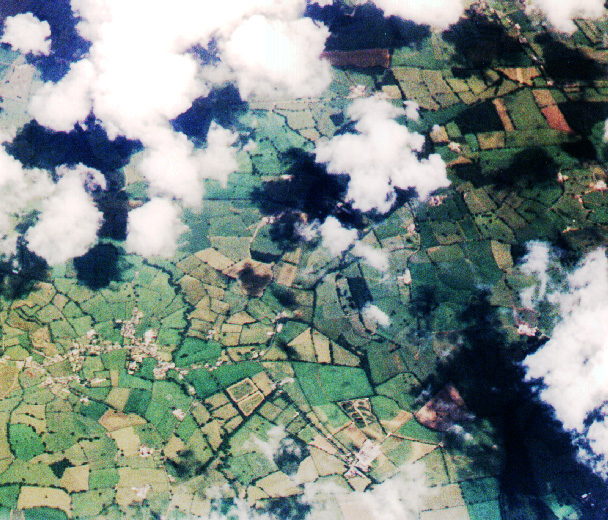A Thesaurus is a reference book of words and their specific related terms: either synonymous or opposite in their meaning to the original word.
.gif) These are some rarely used but, nonetheless, important words to know and use in your essays.
These are some rarely used but, nonetheless, important words to know and use in your essays.
There are also several archaic words for landscape features, such as coomb, coppice, dale, dell, limpid, swale, that suggest we have lost touch with certain landscape features as these words indicate.
![]()
abstruse, contingent, coomb, coppice, contingency, dale, debug, dell, furtive, jocoserious, latent, limpid, lugubrious, marmoreal, naive, obsessive–compulsive, operant, Orient, pendentive, prurient, place, rurality, stochastic, swale,
![]()
abstruse
adjective
Her abstruse arguments were hard to follow.
Meaning: obscure, complex, complicated, involved, over/above one's head, incomprehensible, unfathomable, impenetrable, mysterious, obscurant, arcane, esoteric, little known, recherché, rarefied, recondite, difficult, hard, puzzling, perplexing, cryptic, enigmatic, Delphic--oracular, beyond comprehension, not easily understood.
abstruse, contingent, coomb, coppice, contingency, dale, debug, dell, furtive, jocoserious, latent, limpid, lugubrious, marmoreal, naive, obsessive–compulsive, operant, Orient, pendentive, prurient, place, rurality, stochastic, swale,
![]()
coomb
noun
a short, deep valley between sharp ridge lines, landscape between crests or sharp rise in the topography slipping below surrounding terrain. A hollow.
Believed to be Celtic in origin, having different connotations in Scotland ( a cirque, glaciated ) and Southern England, but also related to Old French combe, a small valley in the sense of narrow passageway.
abstruse, contingent, coomb, coppice, contingency, dale, debug, dell, furtive, jocoserious, latent, limpid, lugubrious, marmoreal, naive, obsessive–compulsive, operant, Orient, pendentive, prurient, place, rurality, stochastic, swale,
![]()
coppice
noun
a forested landscape that is cut over to stimulate growth because it serves as a source of wood and timber.
ORIGIN late Middle English : from Old French copeiz, based on medieval Latin colpus ‘a blow’ or cut. Compare with copse .
abstruse, contingent, coomb, coppice, contingency, dale, debug, dell, furtive, jocoserious, latent, limpid, lugubrious, marmoreal, naive, obsessive–compulsive, operant, Orient, pendentive, prurient, place, rurality, stochastic, swale,
contingent, contingency
adjective, noun.
Literally, with relation to something else. A situation where actors or events are not entirely free, but caused by or dependent on something else, dependent on a previous condition that limits or sets boundaries for the subsequent outcomes. Thus meaning, dependent, tied to, restricted by, or confined by important considerations.
For example a feedback loop, shown here.
Any sort of alternative plan or action is a contingency based on those probable situations that can influence an outcome and thus alternatives help people anticipate the unexpected, based on previous cases where the anticipated outcome was superceded by other probabilities which altered the final disposition of a set of related events.
For example, a person may think they are able to marry anyone they please, until they recognize that income differences, opposite faiths, sexual appetites, or conflicting morals limit who they eventually engage to marry, thus their actual choice is contingent on some limiting factor.
abstruse, contingent, coomb, coppice, contingency, dale, debug, dell, furtive, jocoserious, latent, limpid, lugubrious, marmoreal, naive, obsessive–compulsive, operant, Orient, pendentive, prurient, place, rurality, stochastic, swale,
![]()
furtive
adjective
attempting to avoid notice or attention, typically because of guilt or a belief that discovery would lead to trouble; secretive : they spent a furtive day together | he stole a furtive glance at her. secret .
• suggestive of guilty nervousness : the look in his eyes became furtive.
DERIVATIVES
furtively | adverb
furtiveness
noun
ORIGIN early 17th cent.: from French furtif, -ive or Latin furtivus, from furtum ‘theft.’
secretive, secret, surreptitious, clandestine, hidden, covert, conspiratorial, cloak-and-dagger, backroom, backstairs, sly, sneaky, under-the-table; sidelong, sideways, oblique, indirect; informal hush-hush, shifty.
abstruse, contingent, coomb, coppice, contingency, dale, debug, dell, furtive, jocoserious, latent, limpid, lugubrious, marmoreal, naive, obsessive–compulsive, operant, Orient, pendentive, prurient, place, rurality, stochastic, swale,
![]()
dale
noun
a broad valley
ORIGIN early Norse, Dutch; see dell.
abstruse, contingent, coomb, coppice, contingency, dale, debug, dell, furtive, jocoserious, latent, limpid, lugubrious, marmoreal, naive, obsessive–compulsive, operant, Orient, pendentive, prurient, place, rurality, stochastic, swale,
debug
verb [ trans. ]
1). identify and remove errors from (computer hardware or software) : games are the worst to debug | [as n. ] ( debugging) software debugging.
2). detect and remove concealed microphones from (an area).
3). remove insects from (something), esp. with a pesticide.
noun
the process of identifying and removing errors from computer hardware or software.
abstruse, contingent, coomb, coppice, contingency, dale, debug, dell, furtive, jocoserious, latent, limpid, lugubrious, marmoreal, naive, obsessive–compulsive, operant, Orient, pendentive, prurient, place, rurality, stochastic, swale,
dell,
noun
a narrow valley wherein trees or shrubs are features of the landscape, a small wooded valley.
ORIGIN Old English , of Germanic origin; related to Dutch del and German dialect Telle, also to dale
abstruse, contingent, coomb, coppice, contingency, dale, debug, dell, furtive, jocoserious, latent, limpid, lugubrious, marmoreal, naive, obsessive–compulsive, operant, Orient, pendentive, prurient, place, rurality, stochastic, swale,
![]()
jocoserious
adjective
a mixing of mirth with grave and solemn matters, tragicomedy, a darkly funny, or black humorous statement
"Was the guest conscious of and did he acknowledge these marks of hospitality? His attention was directed to them by his host jocosely, and he accepted them seriously as they drank in jocoserious silence Epps's mass product, the creature cocoa."James Joyce, Ulysses, Chapter 17.
abstruse, contingent, coomb, coppice, contingency, dale, debug, dell, furtive, jocoserious, latent, limpid, lugubrious, marmoreal, naive, obsessive–compulsive, operant, Orient, pendentive, prurient, place, rurality, stochastic, swale,
latent
adjective
(of a quality or state) existing but not yet developed or manifest; hidden; concealed : discovering her latent talent for diplomacy.
• Biology (of a bud, resting stage, etc.) lying dormant or hidden until circumstances are suitable for development or manifestation.
• (of a disease) in which the usual symptoms are not yet manifest.
• (of a microorganism, esp. a virus) present in the body without causing disease, but capable of doing so at a later stage or when transmitted to another body.
DERIVATIVES
latently |ˌleɪtntli| adverb
ORIGIN late Middle English : from Latin latent- ‘being hidden,’ from the verb latere.
abeyant, dormant, latent, quiescent, potential
All of these words refer to what is not currently observable or showing signs of activity.
A latent talent is one that has not yet manifested itself, while potential suggests a talent that exists in an undeveloped state (: a potential concert violinist). A child may have certain latent qualities of which his or her parents are unaware; but teachers are usually quick to spot a potential artist or poet in the classroom.
Dormant and quiescent are less frequently associated with people and more often associated with things. An inactive volcano described as dormant, applies to anything that is currently inactive but has been active in the past and is capable of becoming active again in the future. Dormant carries the connotation of sleeping (: plants that are dormant in the winter), while quiescent means motionless ( | a quiescent sea), emphasizing inactivity without referring to past or future activity.
Abeyant, like dormant, means suspended or temporarily inactive, but it is most commonly used in its noun form (: personal rights and privileges kept in abeyance until the danger had passed).
latent
adjective
his latent skills dormant, untapped, unused, undiscovered, hidden, concealed, underlying, invisible, unseen, undeveloped, unrealized, unfulfilled, potential.
abstruse, contingent, coomb, coppice, contingency, dale, debug, dell, furtive, jocoserious, latent, limpid, lugubrious, marmoreal, naive, obsessive–compulsive, operant, Orient, pendentive, prurient, place, rurality, stochastic, swale,
![]()
limpid
adjective
1 a limpid pool clear, transparent, glassy, crystal clear, crystalline, translucent, pellucid, unclouded. antonym opaque.
2 his limpid prose lucid, clear, plain, understandable, intelligible, comprehensible, coherent, explicit, unambiguous, simple, vivid, sharp, crystal clear; formal perspicuous.
limpid antonym unintelligible.
(of a liquid) free of anything that darkens; completely clear.
• (of a person's eyes) unclouded; clear.
• (esp. of writing or music) clear and accessible or melodious : the limpid notes of a recorder.
DERIVATIVES
Limpidity, noun; limpidly adverb
ORIGIN late Middle English : from Latin limpidus; perhaps related to lymph.
abstruse, contingent, coomb, coppice, contingency, dale, debug, dell, furtive, jocoserious, latent, limpid, lugubrious, marmoreal, naive, obsessive–compulsive, operant, Orient, pendentive, prurient, place, rurality, stochastic, swale,
![]()
lugubrious
adjective: looking or sounding sad and dismal.
DERIVATIVES
lugubriously adverb
lugubriousness noun
ORIGIN early 17th cent.: from Latin lugubris (from lugere ‘mourn’ ) + -ous .
lugubrious hymns | their lugubrious aunt was too melancholy for her own good.
mournful, gloomy, sad, unhappy, doleful, glum, melancholy, woeful, miserable, woebegone, forlorn, somber, solemn, serious, sorrowful, morose, dour, cheerless, joyless, dismal; funereal, sepulchral; informal down in/at the mouth; literary dolorous, glum. antonym cheerful.
abstruse, contingent, coomb, coppice, contingency, dale, debug, dell, furtive, jocoserious, latent, limpid, lugubrious, marmoreal, naive, obsessive–compulsive, operant, Orient, pendentive, prurient, place, rurality, stochastic, swale,
marmoreal
adjective
composed of or comparable to marble stone, cold marbled, or frigidly opaque.
ORIGIN is 18th century from Latin marmoreus ’ from the word marmor for marble.
abstruse, contingent, coomb, coppice, contingency, dale, debug, dell, furtive, jocoserious, latent, limpid, lugubrious, marmoreal, naive, obsessive–compulsive, operant, Orient, pendentive, prurient, place, rurality, stochastic, swale,
naive
adjective
don't be fooled by his naive manner of speaking innocent, unsophisticated, artless, ingenuous, inexperienced, guileless, unworldly, trusting; gullible, credulous, immature, callow, raw, green, wide-eyed; informal wet behind the ears, born yesterday, gullible, antonym worldly.
abstruse, contingent, coomb, coppice, contingency, dale, debug, dell, furtive, jocoserious, latent, limpid, lugubrious, marmoreal, naive, obsessive–compulsive, operant, Orient, pendentive, prurient, place, rurality, stochastic, swale,
obsessive–compulsive
adjective
Psychiatry
denoting or relating to a disorder in which a person feels compelled to perform certain meaningless actions repeatedly in order to alleviate obsessive fears or intrusive thoughts, typically resulting in severe disruption of daily life.
noun
a person characterized by such obsessive behavior.
abstruse, contingent, coomb, coppice, contingency, dale, debug, dell, furtive, jocoserious, latent, limpid, lugubrious, marmoreal, naive, obsessive–compulsive, operant, Orient, pendentive, prurient, place, rurality, stochastic, swale,
![]()
operant Psychology
adjective
involving the modification of behavior by the reinforcing or inhibiting effect of its own consequences (instrumental conditioning).
noun
an item of behavior that is initially spontaneous, rather than a response to a prior stimulus, but whose consequences may reinforce or inhibit recurrence of that behavior.
ORIGIN late Middle English : from Latin operant- ‘being at work,’ from the verb operari.
abstruse, contingent, coomb, coppice, contingency, dale, debug, dell, furtive, jocoserious, latent, limpid, lugubrious, marmoreal, naive, obsessive–compulsive, operant, Orient, pendentive, prurient, place, rurality, stochastic, swale,
![]()
Orient
noun
a culturally biased term for Eastern Asia, worse than saying the Far East, literally meaning to the east. But in the period of cartography or map making in the late middle ages when Constantinople (Istanbul, today) was considered the dividing line of the world (western European world of course) , occident (the west) and orient (the east) where used to demarcate geographical regions with respect to Rome, later London, and Constantinople. Even in the Islamic world the use of Mecca as the geocentric focus of their empire, the cultural blinders persist in delineating the world into segments from our ethnic perspective, as opposed to a more even handed means of determining Asian from European, or North African civilizations.
DERIVATIVES
Oriental, Orientals, orientalize
adverb
ORIGIN late Middle English : from Old French, or from Latin orientalis, from orient.
USAGE The term Oriental, denoting a person from the Far East, is regarded as offensive by many Asians, esp. Asian Americans. It has many associations with European imperialism in Asia. Therefore, it has an out-of-date feel and tends to be associated with a rather offensive stereotype of the people and their customs as inscrutable and exotic.
abstruse, contingent, coomb, coppice, contingency, dale, debug, dell, furtive, jocoserious, latent, limpid, lugubrious, marmoreal, naive, obsessive–compulsive, operant, Orient, pendentive, prurient, place, rurality, stochastic, swale,
![]()
pendentive
noun
Architecture
a curved triangle of vaulting formed by the intersection of a dome with its supporting arches.
Four supporting arches of this dome here form four pendentives embellished with circles of calligraphy.ORIGIN early 18th cent.: from the French adjective pendentif, -ive, from Latin pendent- ‘hanging down,’ from the verb pendere.
abstruse, contingent, coomb, coppice, contingency, dale, debug, dell, furtive, jocoserious, latent, limpid, lugubrious, marmoreal, naive, obsessive–compulsive, operant, Orient, pendentive, prurient, rurality, stochastic, swale,
![]()
etymology of place
According to the dictionary of etymology the following excerpts examine the uses of this word that is bot a noun and a verb:
place
noun
c.1200, "space, dimensional extent, room, area," from Old French place "place, spot" (12c.)
and directly from Medieval Latin placea "place, spot," from Latin platea "courtyard, open space; broad way, avenue," from Greek plateia (hodos) "broad (way)," fem. of platys "broad" (see plaice).
Replaced Old English stow and stede.
From mid-13c. as "particular part of space, extent, definite location, spot, site;" from early 14c. as "position or place occupied by custom, etc.; position on some social scale;" from late 14c. as "inhabited place, town, country," also
"place on the surface of something, portion of something, part," also, "office, post." Meaning "group of houses in a town" is from 1580s.
Also from the same Latin source are Italian piazza, Catalan plassa, Spanish plaza, Middle Dutch plaetse, Dutch plaats, German Platz, Danish plads, Norwegian plass. Wide application in English covers meanings that in French require three words: place, lieu, and endroit. Cognate Italian piazza and Spanish plaza retain more of the etymological sense.
To take place "happen" is from mid-15c. To know (one's) place is from c.1600; hence figurative expression put (someone) in his or her place (1855). Place of worship attested from 1689, originally in official papers and in reference to assemblies of dissenters from the Church of England. All over the place "in disorder" is attested from 1923.
locate
verb
1650s, "to establish oneself in a place, settle," from Latin locatus, past participle of locare "to place, put, set, dispose, arrange," from locus "a place" (see locus).
Sense of "mark the limits of a place" (especially a land grant) is attested from 1739 in American English; this developed to "establish (something) in a place" (1807) and "to find out the place of" (1882, American English). Related: Located; locating.
place
verb
mid-15c., "to determine the position of;" also "to put (something somewhere)," from place (n.).
In the horse racing sense of "to achieve a certain position" (usually in the top three finishers; in U.S., specifically second place) it is first attested 1924, from earlier meaning "to state the position of" (among the first three finishers), 1826.
Related: Placed; placing. To take place "to happen, be accomplished" (mid-15c., earlier have place, late 14c.), translates French avoir lieu.
abstruse, contingent, coomb, coppice, contingency, dale, debug, dell, furtive, jocoserious, latent, limpid, lugubrious, marmoreal, naive, obsessive–compulsive, operant, Orient, pendentive, prurient, place, rurality, stochastic, swale,
![]()
proprioceptive
adjective
Physiology relating to stimuli that are produced and perceived within an organism, esp. those connected with the position and movement of the body. Compare, for example, with exteroceptive and interoceptive.
DERIVATIVES
proprioception| noun – proprioceptively adverb
ORIGIN early 20th cent.: from Latin proprius ‘own’ + receptive
abstruse, contingent, coomb, coppice, contingency, dale, debug, dell, furtive, jocoserious, latent, limpid, lugubrious, marmoreal, naive, obsessive–compulsive, operant, Orient, pendentive, prurient, place, rurality, stochastic, swale,
prurient
adjective
having or encouraging an excessive interest in sexually explicit, erotic, or genital matters : she'd been the subject of much prurient curiosity.
DERIVATIVES
prurience , noun, -- pruriency , noun – pruriently , adverb
ORIGIN late 16th cent.(in the sense [having a mental itching] ): from Latin prurient- ‘itching, longing’ and [being wanton,] from the verb prurire.
she was completely turned off by his prurient remarks salacious, licentious, voyeuristic, lascivious, lecherous, lustful, lewd, libidinous, lubricious; formal concupiscent.
abstruse, contingent, coomb, coppice, contingency, dale, debug, dell, furtive, jocoserious, latent, limpid, lugubrious, marmoreal, naive, obsessive–compulsive, operant, Orient, pendentive, prurient, place, rurality, stochastic, swale,
![]()
Rurality
adjective
that area, land or landscape with the character or quality of cultivated remoteness, fewer people per square mile, and dominated by farms, orchards, fields or topographical contours associate with agricultural countryside.
A rather vague term as opposed to urban or suburban [ see essay: Measuring Rurality. (2007).] meant to convey an absence of densely populated settlements that exclude agrarian improvements of the terrain.
U.S. Index of Relative Rurality, 2000
abstruse, contingent, coomb, coppice, contingency, dale, debug, dell, furtive, jocoserious, latent, limpid, lugubrious, marmoreal, naive, obsessive–compulsive, operant, Orient, pendentive, prurient, place, rurality, stochastic, swale,
Stochastic
adjective
having that character or quality of a guess, or hunch in that the outcome is not certain, since many guesses are wrong; statistically random, but not in the sense that anything can occur, since the probable is more likely to happen than the rare possibility. In a world where events are best understood using statistical variation, the term refers to an inability to precisely predict an outcome of existing or pre-existing events.
USAGE
In a world based on probability and statistical mechanics the term refers to the impossibility of knowing with complete certainty the outcome of real events.
Not predictive, or randomly determined; having a random probability distribution or pattern that may be analyzed statistically but may not be predicted precisely.
DERIVATIVES
stochastically -- adverb
ORIGIN mid 17th cent.: from Greek stokhastikos, from stokhazesthai ‘aim at, guess,’ from stokhos ‘aim.’ To aim at.
abstruse, contingent, coomb, coppice, contingency, dale, debug, dell, furtive, jocoserious, latent, limpid, lugubrious, marmoreal, naive, obsessive–compulsive, operant, Orient, pendentive, prurient, place, rurality, stochastic, swale,
![]()
swale,
noun
a low or hollow place, particularly a marshy depression where water settles between ridges. See: water management.
Etymology: early 16th cent.: British, of unknown origin.
![]()
![]()
abstruse, contingent, coomb, coppice, contingency, dale, debug, dell, furtive, jocoserious, latent, limpid, lugubrious, marmoreal, naive, obsessive–compulsive, operant, Orient, pendentive, prurient, place, rurality, stochastic, swale,
![]()
![]()
revised on July 18, 2014 & July 29, 2011, after July 30, 2007.
Terms | Glossary | Word webs | Basic vocabulary | Advanced Vocabulary | words I use | Antonyms | Synonyms




